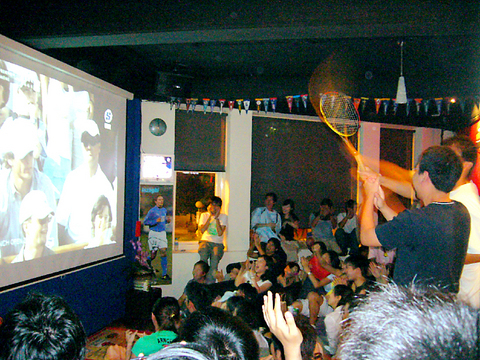The World Cup has demonstrated just how important it is to find a place where you can watch big games on a big screen. It is to meet this need that Hangout Hoops Cafe was created. The restaurant subscribes to three satellite channels that broadcast every major sporting event, from the World Cup and Major League Baseball to the NBA and the French Open tennis tournament.
The main room, which sports a 150-inch big screen TV, has the ambience of a small stadium, getting everyone involved in the game. Many of the sporting events broadcast here can't be seen on local cable TV, and with live broadcasts coming over Japan's J-Sport, Sky Perfect and Philippine's Solar Sport, patrons will never miss a moment of play. Hangout Hoops Cafe shows 15 NBA games per week. Taiwan's cable networks, by comparison, show around five.
Last weekend, Hangout Hoops Cafe played host to more than a hundred fans who were on hand to watch Swiss tennis star Roger Federer battle Spaniard Rafael Nadal in the French Open men's final. As for the World Cup, "We will be showing every game," said Hangout Hoop's 36-year-old owner Steve Chen (

PHOTO: COURTESY OF HANGOUT HOOPS CAFE
Smaller screens show a variety of other sports programs, including sumo wrestling. "We have six small TV sets, where customers can watch different programs. It's a customized service that you can turn to any channel you like," Chen said.
For smaller groups, Hangout Hoops offers a VIP suite with a 100-inch screen. Reservations are required and it costs a minimum of NT$3,000 to rent the room.
At Hangout Hoops, food is secondary to sports. In other words, it's nothing special. The restaurant offers an uninspiring range of dishes that includes beef noodles (
"We only opened on May 31," said Chen, "which is why there isn't much choice right now. We'll be adding stuff to the menu according to the requests of our customers."
A schedule of upcoming sports programming is posted on Hangout Hoop's blog. The information is currently only available in Chinese.

May 11 to May 18 The original Taichung Railway Station was long thought to have been completely razed. Opening on May 15, 1905, the one-story wooden structure soon outgrew its purpose and was replaced in 1917 by a grandiose, Western-style station. During construction on the third-generation station in 2017, workers discovered the service pit for the original station’s locomotive depot. A year later, a small wooden building on site was determined by historians to be the first stationmaster’s office, built around 1908. With these findings, the Taichung Railway Station Cultural Park now boasts that it has

Wooden houses wedged between concrete, crumbling brick facades with roofs gaping to the sky, and tiled art deco buildings down narrow alleyways: Taichung Central District’s (中區) aging architecture reveals both the allure and reality of the old downtown. From Indigenous settlement to capital under Qing Dynasty rule through to Japanese colonization, Taichung’s Central District holds a long and layered history. The bygone beauty of its streets once earned it the nickname “Little Kyoto.” Since the late eighties, however, the shifting of economic and government centers westward signaled a gradual decline in the area’s evolving fortunes. With the regeneration of the once

The latest Formosa poll released at the end of last month shows confidence in President William Lai (賴清德) plunged 8.1 percent, while satisfaction with the Lai administration fared worse with a drop of 8.5 percent. Those lacking confidence in Lai jumped by 6 percent and dissatisfaction in his administration spiked up 6.7 percent. Confidence in Lai is still strong at 48.6 percent, compared to 43 percent lacking confidence — but this is his worst result overall since he took office. For the first time, dissatisfaction with his administration surpassed satisfaction, 47.3 to 47.1 percent. Though statistically a tie, for most

In February of this year the Taipei Times reported on the visit of Lienchiang County Commissioner Wang Chung-ming (王忠銘) of the Chinese Nationalist Party (KMT) and a delegation to a lantern festival in Fuzhou’s Mawei District in Fujian Province. “Today, Mawei and Matsu jointly marked the lantern festival,” Wang was quoted as saying, adding that both sides “being of one people,” is a cause for joy. Wang was passing around a common claim of officials of the People’s Republic of China (PRC) and the PRC’s allies and supporters in Taiwan — KMT and the Taiwan People’s Party — and elsewhere: Taiwan and